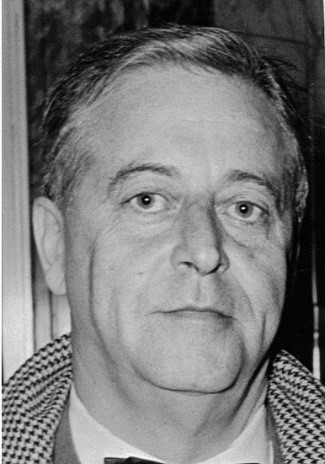T. Lamar Caudle

Theron Lamar Caudle (1945-1947)
Early History: Theron Lamar Caudle was born in 1904 in Wadesboro, North Carolina. He received his undergraduate and law degrees from Wake Forest College and graduated in 1926. Upon admission to the North Carolina Bar, Mr. Caudle joined his father’s law firm in Wadesboro. He would later receive L.L.D. degrees from Duquesne University in 1949 and Catawba College in 1951.
After working in private practice, Mr. Caudle became the prosecuting attorney for Anson County, North Carolina. In 1940, he was appointed by President Franklin D. Roosevelt as U.S. Attorney for the Western District of North Carolina. While U.S. Attorney, Mr. Caudle became close to Thomas Campbell Clark, who was then the Assistant Attorney General for the Criminal Division.
Tenure: In 1945, following Mr. Clark’s nomination as U.S. Attorney General, Mr. Caudle was appointed by President Harry S. Truman to fill the vacancy left by Mr. Clark. Mr. Caudle arrived in Washington, D.C. with his family in September 1945, the first time he had lived for any extended period of time outside of North Carolina.
Under his supervision as Assistant Attorney General, the Criminal Division took a strong interest in civil rights cases, most prominently in connection with the 1946 lynching of John C. Jones at the hands of a mob in Louisiana. Following the refusal of local law enforcement to make any arrests or prosecute Jones’s murderers, the Criminal Division opened a case against six suspects, including two local police officers. Mr. Caudle closely oversaw the prosecution, which resulted in acquittals after the defendants successfully argued to a local jury that the prosecution was a politically motivated attack on the South.
Mr. Caudle, however, remains more widely known for several political scandals. Mr. Caudle’s first such involvement was when the Justice Department became embroiled in a Missouri voter fraud scandal involving the 1946 Kansas City Democratic congressional primary. The surprise victory of a relatively obscure candidate who had been backed by President Truman—and the Department’s decision to decline to open an investigation into allegations of fraud in that election—became the basis for accusations by the state’s Republican Senator, who demanded a Senate investigation into Mr. Caudle’s decision.
Later Career: In 1947, Mr. Caudle was named Assistant Attorney General for the Tax Division. Mr. Caudle served in this capacity until November 1951, when President Truman asked for his resignation amid Congressional inquiries concerning many aspects of the administration, including the Justice Department’s prosecution of tax laws. Mr. Caudle returned to private practice in North Carolina.
Following the election of President Dwight D. Eisenhower, Mr. Caudle was a frequent witness before Congressional and other investigative bodies that set about investigating alleged scandals involving the Truman Administration. At the time, then-former President Truman complained to reporters that the Republican-led Justice Department “has put investigators on me and everyone around me to find something wrong.”
Investigators focused on a 1951 tax fraud prosecution that Mr. Caudle had overseen. That summer, Mr. Caudle had received a request from a Truman Administration official named Matthew Connolly seeking an indefinite postponement of a case against a St. Louis shoe salesman named Irvin Sachs. Sachs had been indicted in 1947 for evading over $128,000 in federal income taxes. Sachs’s attorney, Harry Schwimmer, had contacted Connolly in early 1951 asking that the Administration postpone Sachs’s trial due to poor health. Although Mr. Caudle denied Connolly’s request, he ultimately recommended that his prosecutors accept a guilty plea. Sachs pleaded guilty later that year and received a sentence of probation and a fine of $40,000. He had been facing several years’ imprisonment.
Following the resolution of the case, Schwimmer gifted Connolly suits and other items worth several hundred dollars. Schwimmer also purchased oil royalties worth several thousand dollars each in the names of both Connolly and Mr. Caudle. Connolly accepted the royalty, but Mr. Caudle rejected the proposed gift. Mr. Caudle, Connolly and Schwimmer were indicted in 1955 for conspiring to defraud the federal government of tax revenue by fixing the Sachs case.
Mr. Caudle denied knowing that Schwimmer intended to gift him the oil royalty, and insisted that his decision to recommend that Sachs receive probation upon his plea was in line with the then-policies of the Tax Division. Nevertheless, after a 37-day trial, a jury convicted Mr. Caudle and Connolly. (Schwimmer, suffered a heart attack during trial and was granted a mistrial; he was never retried.) The trial was marred by unusual behavior of the district judge—including inconsistent rulings. The judge had been under the supervision of a psychiatrist during the trial, a fact which came to light after the judge committed suicide shortly after the verdict. The two defendants were subsequently sentenced to two years in prison.
Following several unsuccessful appeals—including three petitions to the U.S. Supreme Court—Mr. Caudle entered prison in 1960. Following his release, Mr. Caudle returned home to Wadesboro, North Carolina. He consistently maintained his innocence. A subsequent investigation by a House committee determined that Mr. Caudle “was weak and the naive code of a country lawyer did not serve him well in the corrupting sophistication of the Washington he knew; he made errors of judgment; and he swallowed more in the name of personal loyalty than any man should stomach. But [he] never sold himself for riches or for power.”
In August 1965, Mr. Caudle received a full pardon from President Lyndon B. Johnson. In 1969, he died at his home in Wadesboro, North Carolina.
This material is based on the review of a variety of historical sources and its accuracy cannot be guaranteed. If you have any corrections or additional information about this individual or about the history of the Criminal Division, please contact the Division.

 U.S. Department
of Justice
U.S. Department
of Justice